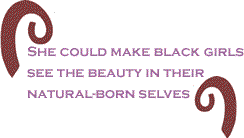
|
|||||||||||||||||||||||

|
|

Custom Search
|
|
 |
|
From the time Barack Obama became a fixture on the national stage, I have eyed Michelle Obama with an uneven mix of appreciation and disappointment.
It’s not about her countenance, though she’s been attacked for not smiling enough, scowling at inopportune times and having a toothy grin. It’s not about her skin tone, though some mainstream magazines lightened her up a few shades when they placed her on their covers. It’s about her hair. Here we have a sister in one of the most visible, transformative positions on the planet, and she’s wearing colonization on her crown. I don’t care if she has a relaxer or is “really natural” and “just” presses or flat irons her hair. My issue is that she apparently feels the need or inclination to rock a straight ‘do; that she just may have a standard that posits straightened hair as an ideal, when she could forever change the way black men and women – and non-black persons nationally and globally – perceive and react to our natural curls, kinks, coils and zigzags. I’m not the only one who feels this way. I informally surveyed some black women just to make sure I wasn’t off target. “I think the standard that some black women choose to exemplify in terms of their appearance would be different because she’s in a role to be a trendsetter,” said a 20-something sister. “If she did that it would be a huge statement,” said another 30-something who presses her hair and wears hair pieces on occasion. “I would identify with that gesture as I did with the two Olympians who held their fist in the air at the Olympics. We have been brainwashed to believe that we are not ‘pretty’ unless we go blonde, add tracks or process our hair straight. The funny thing about all of it is that now white women are spending LOTS of money trying to be like the one image they have tried to change for so many years – the image of a black woman.”
Clearly, Michelle Obama cannot be completely averse to natural hair. Her older daughter, Malia, is frequently photographed with cornrows, twists and braids. We as mothers have a responsibility to our daughters that transcends providing for their basic needs. We have an obligation to project an image that reflects the self-esteem we want them to radiate. For a long time, I have believed that black mothers should wear their hair naturally. This discussion isn’t about options, manageability or convenience – the rationales that black women who straighten their hair often rely on for their opening arguments. We have an agenda that is bigger than that. Liking – and loving – ourselves, as Yahweh made us. BlackCommentator.com Columnist K. Danielle Edwards is a Nashville-based communications expert, writer and poet whose works have been featured in The Root, The Washington Post, National Public Radio, Black Magnolias Literary Journal, Parenting Express, Mamazine, Mamaphonic, The Black World Today, Africana.com and new work will be featured in the inaugural issue of Mythium. She is the founder and editor of the forthcoming online literary journal TheWriteMother.com and has taught creative writing at the Tennessee Prison for Women. Click here to contact Ms. Edwards. |
|
Any BlackCommentator.com article may be re-printed so long as it is re-printed in its entirety and full credit given to the author and www.BlackCommentator.com. If the re-print is on the Internet we additionally request a link back to the original piece on our Website. Your comments are always welcome. eMail re-print notice
If you send us an eMail message we may publish all or part of it, unless you tell us it is not for publication. You may also request that we withhold your name. Thank you very much for your readership. |
|
| |
|
| June
11 , 2009 Issue 328 |
|
| Executive Editor: Bill Fletcher, Jr. |
| Managing Editor: Nancy Littlefield |
| Publisher: Peter Gamble |
| Est. April 5, 2002 |
Printer Friendly Version
in resizeable plain
text format or pdf
format. |
| Frequently Asked Questions |
 |

|
 |
 |
 |
| |
| |





























 Okay,
so I’m not crazy. Nor am I alone in my opinion that if Mrs. Obama
sported some twists, a fro, or, dare I suggest, locks, she could
change the world. She could make black girls see the beauty in their
natural-born selves and do away with the age-old towel-hair dress-up
game. Her image could transform the hair care industry and stimulate
the black economy. We’d have less trepidation about wearing natural
hairstyles in the workplace or on a job interview. Sisters could
go swimming and not care about being seen out in public with their
organized fuzz in full view. Brothers would realize, en masse, that
there is something cosmic and convenient about being with a woman
who doesn’t need an arsenal of thermal tools or chemical treatments
to keep up her appearance.
Okay,
so I’m not crazy. Nor am I alone in my opinion that if Mrs. Obama
sported some twists, a fro, or, dare I suggest, locks, she could
change the world. She could make black girls see the beauty in their
natural-born selves and do away with the age-old towel-hair dress-up
game. Her image could transform the hair care industry and stimulate
the black economy. We’d have less trepidation about wearing natural
hairstyles in the workplace or on a job interview. Sisters could
go swimming and not care about being seen out in public with their
organized fuzz in full view. Brothers would realize, en masse, that
there is something cosmic and convenient about being with a woman
who doesn’t need an arsenal of thermal tools or chemical treatments
to keep up her appearance.






